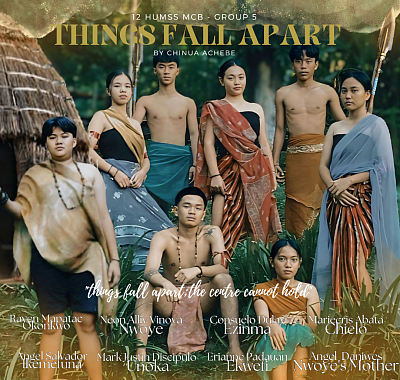Group 5 Literary Analysis
"Things fall apart; the centre cannot hold"
Introduction
Chinua Achebe’s Things Fall Apart (1958) is a groundbreaking piece of African literature that examines the intricacies of Igbo society before colonial influence and the severe impacts of European colonization. Taking place in late 19th-century Nigeria, the novel follows Okonkwo, a determined and proud Igbo leader whose life and community face upheaval due to the arrival of British missionaries and rulers. Achebe crafts a narrative that delves into themes of cultural fragmentation, identity, masculinity, and the tension between tradition and progress. With its rich symbolism, vivid character development, and complex structure, Things Fall Apart offers a significant critique of colonialism while honoring African cultural heritage.
Analysis
Chinua Achebe’s Things Fall Apart tells the story of pre-colonial African society and the effects of European colonization. The novel is set in the Igbo village of Umuofia and follows Okonkwo, a respected leader and warrior, as he tries to protect his culture while facing change and conflict. The story focuses on the clash between traditional Igbo customs and the arrival of European missionaries and colonizers. Achebe shows how Igbo society is strong and rich in culture but also vulnerable to outside forces that disrupt its way of life.
Okonkwo’s character highlights themes of masculinity, pride, and resistance. He values strength and rejects anything he sees as weak, which often causes problems in his relationships and decisions. His refusal to adapt to the changes brought by colonization leads to his tragic downfall, representing the struggles of a society unable to survive the pressures of a new order. Other characters, like his son Nwoye, who converts to Christianity, and his friend Obierika, who is more thoughtful and adaptable, show different responses to the challenges of change.
Achebe writes in a simple but powerful way, using both English and Igbo sayings to bring the culture to life. The story is divided into three parts, reflecting the rise, disruption, and fall of Igbo society. Achebe uses symbols like the locusts, fire, and yams to represent destruction, identity, and traditional values.
In the end, Things Fall Apart is a story about how colonization changes a community and the difficulties of holding onto one’s identity. Achebe gives a detailed and respectful view of African culture, challenging negative stereotypes and showing its complexity and huma
nity.
Theme: Conflict of Cultures
Achebe emphasizes the conflict between traditional Igbo culture and the encroaching influences of colonialism. The Igbo community, presented as having a rich and structured social framework, confronts significant challenges with the introduction of Christianity and British rule. This conflict is notably represented by individuals like Nwoye, who convert to Christianity, highlighting the weakening of community bonds. Achebe depicts the colonial influence as both dislocating and subtly damaging, showcasing the slow disintegration of a previously unified society.
Foreshadowing
One example is the arrival of the locusts. The villagers see them as a blessing and celebrate their arrival, but the locusts actually symbolize the coming of the Europeans, who will bring destruction to their way of life. Another instance is the death of Ikemefuna, a boy who lives with Okonkwo's family. Even though Okonkwo is warned not to take part in the boy’s killing, he does so out of fear of appearing weak. This act foreshadows Okonkwo’s downfall, as it shows how his fear of weakness leads him to make harmful choices.
Okonkwo’s fear of becoming like his father, Unoka, is another example. Unoka was seen as weak and unsuccessful, and Okonkwo spends his life trying to be the opposite. However, this fear makes Okonkwo overly harsh and stubborn, foreshadowing his inability to adapt to the changes brought by colonization. Finally, the breaking of the kola nut, which is a symbol of peace and unity in Igbo culture, contrasts with the later division and conflict in the community, hinting at the coming destruction of their traditional way of life.

